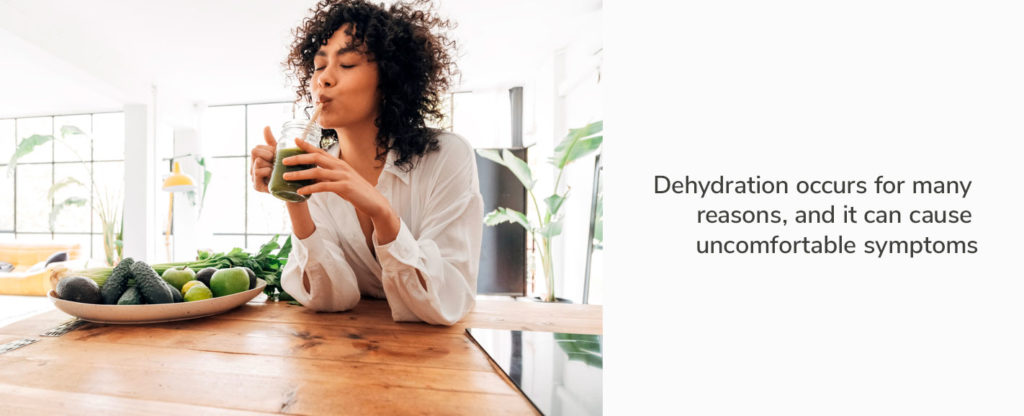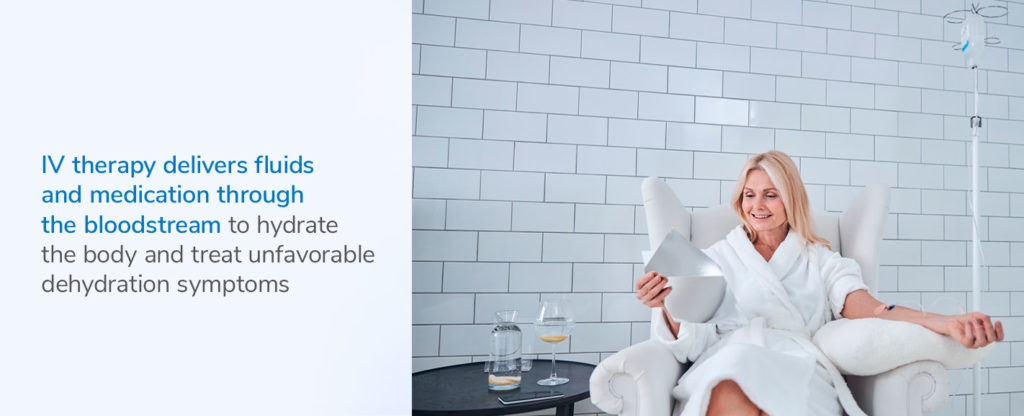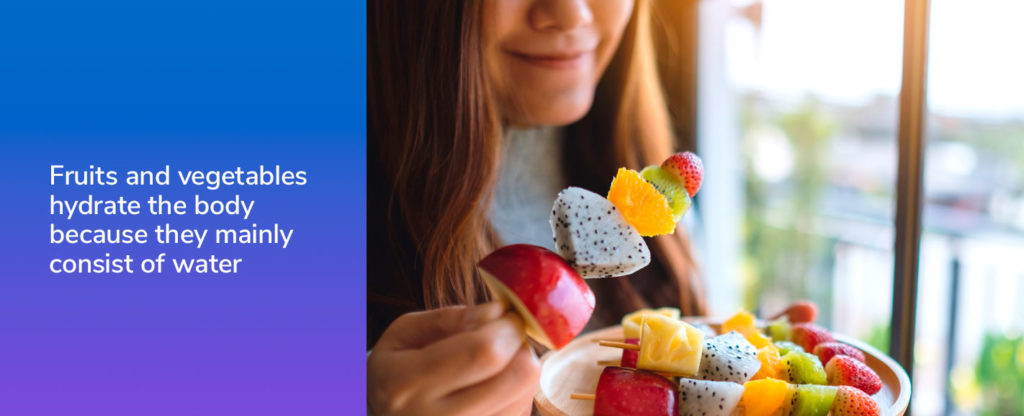Table of Contents:
- What Are the Symptoms of Dehydration?
- How to Rehydrate Fast at Home
- How to Super Hydrate Your Body Without Drinking or Eating
- Rehydrate With Mobile IV Medics
Dehydration occurs for many reasons, and it can cause uncomfortable symptoms. Water is the most common hydration solution, but you can also rehydrate your body with other liquids, nutritious foods, and IV therapy. Healthy fruits and vegetables, sports drinks, and other substances are tastier than water and can replenish the body with essential vitamins and nutrients. However, when these hydration methods fail to provide relief, IV therapy can help to alleviate dehydration symptoms.
What Are the Symptoms of Dehydration?
Water is essential to our bodies. It circulates blood, aids digestion, removes waste, lubricates joints, keeps skin healthy, supports cardiac and cognitive function, regulates body temperature and transports nutrients. Dehydration can cause these functions to break down, and it occurs when the body loses more fluids than it receives.

Various factors and conditions, such as sweating, diarrhea, vomiting, diuretic medications, fever, excessive sun exposure and excessive alcohol consumption can cause dehydration. Older adults, young children and individuals with particular medical conditions, such as kidney disease and diabetes are more vulnerable to dehydration than others. Dehydration can cause some or all of the following symptoms:
- Headaches
- Dry mouth
- Increased thirst
- Fatigue
- Dry skin
- Infrequent urination
- Dizziness
- Dark-colored urine
When a person is dehydrated, they may feel light-headed, dizzy and more tired than usual, and they may experience headaches. They may feel thirstier than they usually are and have a dry mouth or dry skin. Urine is a common hydration level indicator. Urine is typically a paler color when the body is hydrated and a darker color when dehydrated. However, urine color can also change due to certain medications, diet and particular medical conditions.
How to Rehydrate Fast at Home
Since dehydration can occur quickly and frequently based on health habits, activities and health conditions, it’s important to know how to rehydrate your body. Dehydration symptoms can be uncomfortable, so you should try to rehydrate as soon as you start to experience symptoms. The following methods can help to rehydrate your body:
Fruits and Vegetables
Fruits and vegetables hydrate the body because they mainly consist of water. The following fruits have high water density:
- Strawberries: Water makes up 91% of strawberries.
- Cantaloupe: Cantaloupe is 90% water.
- Watermelon: Watermelon has 92% water content.
- Oranges: Oranges consist of 88% water.
- Peaches: Peaches have 89% water content.
- Blueberries: Blueberries are approximately 84% water.
Vegetables also contain high amounts of water. The following vegetables have high water density:
- Celery, radishes, cucumbers & lettuce: These vegetables are made up of about 95% water.
- Green bell papers: Green bell peppers consist of about 94% water.
- Asparagus: Asparagus contains about 93% water.
- Spinach: Spinach contains approximately 91% water.
You can also juice fruits and vegetables to gain nutrients and hydration. Both fruit and vegetable juices hydrate the body, but vegetable juices are slightly healthier than fruit juices because fruit contains natural sugars that enter the bloodstream faster in juice form.

Oatmeal
Oatmeal is a hydrating way to start your mornings. Oats absorb the water or milk they’re cooked in when they cook, so they are both a hydrating and hearty meal. Mix in some berries or other fruit to add flavor and extra nutrition. You can also add chia seeds, which add hydration because they absorb liquid. If hot oatmeal isn’t your favorite, try overnight oats that absorb liquid in the fridge overnight and don’t require heat.
Sports Drinks
Sports drinks can rehydrate the body because of their many nutrients, such as minerals, vitamins, carbohydrates and electrolytes. Electrolytes are essential to health and hydration. Sports drinks are popular among athletes because they replace the body’s electrolytes that people lose during and after physical activity.
Coffee and Tea
Drinking coffee and tea can also rehydrate the body when people consume them in moderation and in addition to water. Coffee and tea both contain caffeine, which can dehydrate the body in large amounts, so it’s important to limit consumption to one or two glasses and supplement them with water or other liquids.
Coffee starts to dehydrate in the amount of two to three 8-ounce cups, but one cup of coffee in addition to other liquids throughout the day can help to keep the body hydrated. Tea can start to dehydrate in the amount of five to eight 8-ounce cups, but having a couple of glasses can help to rehydrate the body.
You can brew fresh tea leaves or herbal tea in hot water or opt for iced tea if you prefer cold beverages. Try to avoid sweetened iced teas or adding sweeteners because this can hinder tea’s hydration abilities.
Flavored Seltzers
Flavored seltzers contain water, carbonation and sometimes added flavors. For the best hydration results, choose seltzers without added sugars or high sodium content. You can also flavor seltzer yourself with vanilla extract or citrus.
Skim and Lowfat Milk
Milk contains various nutrients, protein and high electrolyte concentrations, which help to hydrate the body. Skim milk contains calcium, vitamin A, vitamin B12, riboflavin, potassium, phosphorus and over 91% water. Having a glass or two of milk throughout the day or after exercise can help to hydrate the body, but people should avoid it if they have any gastrointestinal dehydration symptoms because milk can worsen these.

How to Super Hydrate Your Body Without Drinking or Eating
When water, fruits, vegetables and other dehydration remedies aren’t providing desired relief, intravenous (IV) therapy can help. IV therapy delivers fluids and medication through the bloodstream to hydrate the body and treat unfavorable dehydration symptoms. IV bags commonly contain saline, dextrose, calcium chloride, potassium chloride, sodium lactate, vitamin B, vitamin C, magnesium, calcium and antioxidants. IV therapy is a healthy way to stay hydrated without drinking or eating.
IV fluids can rehydrate the body after alcohol consumption or intense physical activity. They can also alleviate dehydration symptoms of morning sickness, migraines, food poisoning and other health conditions. IV therapy typically lasts for 45 minutes to an hour, and its effects depend on an individual’s condition. Some people experience immediate symptom relief, while others start to feel relief later in the process.
Liquids and nutritious foods can often treat mild dehydration symptoms, but severe dehydration cases often require more nutrients and a faster delivery method. IV therapy ensures that fluid, vitamins and minerals enter the bloodstream fast for increased chances of relief. IV therapy promotes health and can be administered in hospitals, urgent care centers, medical spas, IV bars and even in the comfort of your own home.
Rehydrate With Mobile IV Medics
Having a few drinks at the bar, pushing through an intense workout, soaking up too much sun or enduring an illness can cause uncomfortable dehydration symptoms. When fluids and food aren’t bringing relief, IV therapy can help alleviate symptoms. Mobile IV Medics will bring dehydration treatment to your home so you can alleviate symptoms in the comfort of your home and without the expensive hospital bill.
Our team of experienced Registered Nurses will administer quality IV treatment to help provide relief for various conditions. When you feel under the weather and don’t want to leave your house, we provide a fast, reliable and painless solution. We offer a topical numbing spray for optimal comfort, and our knowledgeable team operates under a qualified Medical Director and Pharmacist.
When dehydration disrupts your day, treat your symptoms with quality IV therapy. Schedule an IV drip to alleviate uncomfortable dehydration symptoms or contact us to learn more about our IV therapy services.




